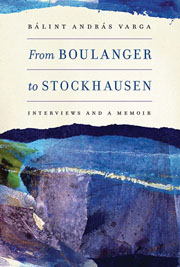Book contents
- Frontmatter
- Dedication
- Contents
- Foreword
- Acknowledgments
- Part One Interviews
- Preface to the Interviews
- Composers
- Georges Auric
- Alois Hába
- György Kurtág
- György Ligeti
- Karlheinz Stockhausen
- Conductors
- Instrumentalists
- Singers and a Record Producer
- A Teacher
- Music Administrators
- Snippets
- Part Two A Memoir
- Notes in Retrospect
- Index
- Miscellaneous Endmatter
Karlheinz Stockhausen
from Composers
Published online by Cambridge University Press: 05 January 2014
- Frontmatter
- Dedication
- Contents
- Foreword
- Acknowledgments
- Part One Interviews
- Preface to the Interviews
- Composers
- Georges Auric
- Alois Hába
- György Kurtág
- György Ligeti
- Karlheinz Stockhausen
- Conductors
- Instrumentalists
- Singers and a Record Producer
- A Teacher
- Music Administrators
- Snippets
- Part Two A Memoir
- Notes in Retrospect
- Index
- Miscellaneous Endmatter
Summary
I recorded two interviews with Karlheinz Stockhausen in Budapest, in October 1984: one for my three-questions book and one for Hungarian Television. Both were included by the composer in volume 6 of his collections of writings, which goes to show, I believe, that he attributed some significance to them.
In deciding on the main thrust of the television interview, I was bearing in mind the kind of viewers our conversation was likely to address. Rather than discuss questions of a musicological nature, I wanted to sketch a portrait of Stockhausen, knowing full well, of course, that it would come across anyway, thanks to his total dedication to his calling as a prophetic composer and his magnetic personality.
Even though I had expected him to come up with something uniquely original, his response to my first question exceeded all my expectations. With two older works of his being performed at Budapest's new music festival (HYMNEN and HARLEKIN), I asked him if he was still the same person as the Stockhausen who had written those compositions. I suppose the notion of identity with one's former self is something that occupies many people's minds. In the back of my own may have been a story by the Hungarian writer Frigyes Karinthy (1887–1938): in “Encounter with a Young Man,” he describes meeting his younger self who reproaches him for failing to live up to his ideals.
- Type
- Chapter
- Information
- From Boulanger to StockhausenInterviews and a Memoir, pp. 58 - 64Publisher: Boydell & BrewerPrint publication year: 2013



